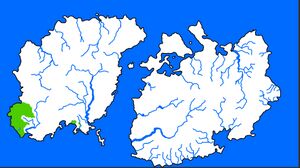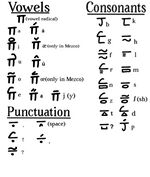Psér
This article is a construction site. This project is currently undergoing significant construction and/or revamp. By all means, take a look around, thank you. |
| Psér | |
|---|---|
| ēago ebēsri | |
 The Psér endonym in the Pséri alphabet. | |
| Pronunciation | [ˈeː.ago ˈebeː.ʂɹi] |
| Created by | Jukethatbox |
| Setting | Radael |
| Native to | Briŭyeg, Tusgŭ, Tugcher Region |
| Native speakers | ~600,000 (400 UH) |
Early forms | Proto-Gadaïc
|
Standard form | Psérg dialect(ugēm idri)
|
Dialects |
|
| Official status | |
Official language in | Briŭyeg, Tusgŭ |
Recognised minority language in | Moshurian Empire, Xŭthi |
| Regulated by | SEE |
 Map of Psér speakers. Dark green represents majority Psér-speaking areas, and light green represents significant minority communities. | |
Psér(ēago ebēsri, Psér: [ˈeː.ago ˈebeː.ʂɹi]) is one of the oldest Gadaïc languages in Talkoch. It is one of the only modern Gadaïc languages that still mostly derive from Paleogadaic, as opposed to Proto-Gadaïc which all other Gadaïc languages derive from. Its alphabet, the Pséri alphabet, is one of the oldest in Radael, and modified versions of it are used in Ösrish, Arnic and Isali. Some languages like Mezco are directly descended from Psér, which can be seen in sentences like nœ yago ridyær(Mezco, "we have food") and Psér nŭ yako ildeā.
Phonology
Orthography

Psér uses a modified version of one of the oldest alphabets in Radael, the Ancient Gadir alphabet. The notable differences between the original alphabet with the Pséri alphabet is that glottal stops have their own symbols, and vowels with diacritics(ŭ for example) also have their own symbols.
Some symbols, like the symbol for æ and œ, are exclusive to Mezco which also uses the Pséri alphabet, although Mezco also uses the Moshurian alphabet.
Consonants
| Labial | Labiodental | Alveolar | Post-alveolar | Retroflex | Palatal | Velar | Glottal | |||||||||
|---|---|---|---|---|---|---|---|---|---|---|---|---|---|---|---|---|
| Nasal | m | n | (ŋ) | |||||||||||||
| Plosive | p | b | t | d | k | ɡ | ʔ | |||||||||
| Fricative | f | s | z | ʃ | (ʂ) | h | ||||||||||
| Approximant | (ɹ) | j | ||||||||||||||
| Lateral approximant | l | |||||||||||||||
| Flap | ɽ | |||||||||||||||
/ʂ/ and /ɹ/ are only pronounced in the dipthong ⟨sr⟩. In all other cases ⟨s⟩ is pronounced /s/ and ⟨r⟩ is pronounced /ɽ/.
Vowels
| Front | Central | Back | ||
|---|---|---|---|---|
| Close | i | u | ||
| Close-mid | e | o | ||
| Mid | ə | |||
| Open-mid | ε | ɔ | ||
| Near-open | æ | |||
| Open | a | |||
Prosody
Stress
Psér, like its ancestor Paleogadaic, is prototonic, meaning that stress is placed on the first syllable of a word. This means that some Moshurian loanwords, a language where stress is placed on the penultimate syllable, change significantly in Psér due to the rare prototonic rule, e.g. Moshurian chirit becomes Psér shtiyr.
Phonotactics
Morphophonology
Morphology
Verbs
Most verbs in Psér end in ā(/aː/), and are not inflected. They appear after the object, although sometimes they can be found before the object. Additionally, in some dialects the zero copula feature is used, meaning that the verb "to be"(gornā) is not used in a sentence, e.g. Descartes' famous quote I think, therefore I am would be Kri kuludā, yir kri, or literally I think, so I (am). In Standard Psér however, the zero copula does not appear, and Descartes' quote would still be Kri kuludā, yir kri gornā.
Syntax
Constituent order
Psér uses an SOV(subject-object-verb) structure, as so:
- kri uboyē dmuryā.
- 1SG apple-ACC eat.
Noun phrase
Verb phrase
Sentence phrase
Dependent clauses
Dialects
Psérg
Psérgi is the standard dialect of Psér. It is mostly derived from various dialects spoken by deportees during the Faa Massacre. These various dialects mixed to become the singular dialect spoken in Psérg and the general Tugcher Region, which was then chosen by the SEE as the standard dialect of Standard Psér.
Tusgŭ
Tusgŭ is the dialect spoken in Tusgŭ and minority communities in Xŭthi. It is one of the oldest dialects, and the Pséri alphabet was designed with the Tusgŭ dialect in mind. It is considered, in the Minŭre religion, as the holiest of Psér dialects.
There is also a small faction within the SEE, known as SEE-Tusgŭ, who advocates for Standard Psér to be based on the Tusgŭ dialect. Many of the supporters and members of the faction are native Tusgŭ speakers or are part of the aforementioned Minŭre religion.
Miskŭ
Miskŭ is the dialect mainly spoken in Briŭyeg. It's name comes from the Psér name for the Mezcof Basin, and it has had some influence on Mezco.
Eastern Hyrîaow
Eastern Hyrîaow is the only dialect that is no longer spoken by any Psér speaker(L2 or native), and is named after the Hyrîaow mountain range. The notable differences between standard Psér is that /e/ was instead pronounced [æ], and ŭ tended to be pronounced [ɶ], as well as stress being placed on the penultimate syllable instead of the first. These differences eventually mixed with Mezecki, eventually forming a creole in the Mezcof, which later became known as Mezco.
